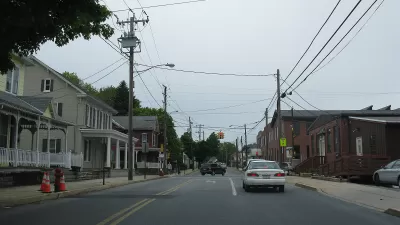A zoning controversy in a neighborhood in New Orleans has locals questioning how well the city's new Comprehensive Zoning Plan reflects the city's Master Plan.
Chris Maldonado reports from New Orleans: "A group of residents who live near the closed McDonogh No. 31 school site on Thursday announced that it is proposing a change to the city’s new Comprehensive Zoning Ordinance that its representatives say will fix an error in the zoning law that allows developers to build inappropriately dense developments in some historic neighborhoods."
"The group’s proposed amendment would shrink the maximum housing density in affected neighborhoods by nearly 35 percent," writes Maldonado, but the issue centers on a development proposal for the aforementioned No. 31 school site. The proposal would build a 30-unit apartment building and several houses nearby. According to the article, "the Comprehensive Zoning Ordinance, which the City Council passed in May after years of debate, allows for as many as 45 housing units on the site."
The group opposing the development, known as Neighbors for Responsible Development, are citing the disconnect between the Comprehensive Zoning Ordinance and the city's Master Plan to oppose the development.
Maldonado explains the discrepancy, as it's understood by the group's members:
"According to group members, the Master Plan called for two types of multi-family zoning in older neighborhoods. The neighborhood around the McDonogh 31 site was originally supposed to be lower density, with no more than 24 units per acre. The plan called for medium density housing in other neighborhoods, up to 36 units.
But the zoning law omitted the lower density category, putting the neighborhood, and others, into a zoning district, HU-RM1, that allows up to 35 units per acre, nearly 50 percent above what the group thinks should be allowed in the neighborhood."
No word yet about when to expect some resolution of the controversy, but the group considers their agenda to have the force of law—not a policy recommendation.
FULL STORY: Neighbors seeking to create another, less-dense zoning category

Maui's Vacation Rental Debate Turns Ugly
Verbal attacks, misinformation campaigns and fistfights plague a high-stakes debate to convert thousands of vacation rentals into long-term housing.

Planetizen Federal Action Tracker
A weekly monitor of how Trump’s orders and actions are impacting planners and planning in America.

In Urban Planning, AI Prompting Could be the New Design Thinking
Creativity has long been key to great urban design. What if we see AI as our new creative partner?

King County Supportive Housing Program Offers Hope for Unhoused Residents
The county is taking a ‘Housing First’ approach that prioritizes getting people into housing, then offering wraparound supportive services.

Researchers Use AI to Get Clearer Picture of US Housing
Analysts are using artificial intelligence to supercharge their research by allowing them to comb through data faster. Though these AI tools can be error prone, they save time and housing researchers are optimistic about the future.

Making Shared Micromobility More Inclusive
Cities and shared mobility system operators can do more to include people with disabilities in planning and operations, per a new report.
Urban Design for Planners 1: Software Tools
This six-course series explores essential urban design concepts using open source software and equips planners with the tools they need to participate fully in the urban design process.
Planning for Universal Design
Learn the tools for implementing Universal Design in planning regulations.
planning NEXT
Appalachian Highlands Housing Partners
Mpact (founded as Rail~Volution)
City of Camden Redevelopment Agency
City of Astoria
City of Portland
City of Laramie





























